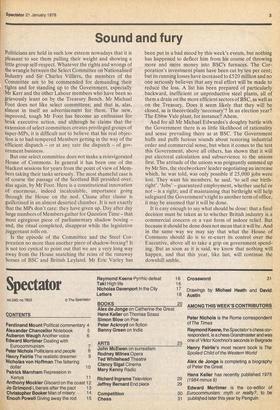Sound and fury
Politicians are held in such low esteem nowadays that it is pleasant to see them pulling their weight and showing a little group self-respect. Whatever the rights and wrongs of the wrangle between the Select Committee on Nationalised Industry and Sir Charles Villiers, the members of the Committee are to be commended for demanding their rights and for standing up to the Government, especially Mr Kerr and the other Labour members who have been so grievously leant on by the Treasury Bench. Mr Michael Foot does not like select committees; and that is, alas, almost in itself an advertisement for them. The new, improved, tough Mr Foot has become an enthusiast for brisk executive action, and although he claims that the extension of select committees creates privileged groups of super-MPs, it is difficult not to believe that his real objection is to bad-tempered Members getting in the way of the efficient dispatch — or at any rate the dispatch — of government business.
But one select committee does not make a reinvigorated House of Commons. In general it has been one of the blackest sessions for years from the point of view of Members taking their tasks seriously. The most shameful case is of course the passage of the Scotland Bill presided over, alas again, by Mr Foot. Here is a constitutional innovation of enormous, indeed incalculable, importance going through the House on the nod. Clause after clause is guillotined in an almost deserted chamber. It is not exactly that the MPs don't care: they have given up. Day after day large numbers of Members gather for Question Time — that most egregious piece of parliamentary shadow boxing — and, the ritual completed, disappear while the legislative juggernaut rolls on.
Is the episode of the Committee and the Steel Corporation no more than another piece of shadow-boxing? It is not too cynical to point out that we are a very long way away from the House snatching the reins of the runaway horses of BSC and British Leyland. Mr Eric Varley has been put in a bad mood by this week's events, but nothing has happened to deflect him from his course of throwing more and more money into BSC's furnaces. The Corporation's investment plans have been cut by ten per cent; but its running losses have increased to £520 million and no one seriously believes that any real effort will be made to reduce the loss. A list has been prepared of particularly backward, inefficient or unproductive steel plants, all of them a drain on the more efficient sectors of BSC, as well as on the Treasury. Does it seem likely that they will be closed, as is theoretically 'necessary'? In an election year? The Ebbw Vale plant, for instance? Ahem.
And for all Mr Michael Edwardes's doughty battle with the Government there is as little likelihood of rationality and sense prevailing there as at BSC. The Government huffs and puffs furious sounds about restoring industrial order and commercial sense, but when it comes to the test this Government, above all others, has shown that it will put electoral calculation and subservience to the unions first. The attitude of the unions was poignantly summed up by Mr Sirs, the steelworkers' leader negotiating an increase which, he was told, was only possible if 25,000 jbbs were lost. They want his members, he said, 'to sell our birthright'. 'Jobs' — guaranteed employment, whether useful or not — is a right; and if maintaining that birthright will help safeguard the Government's right to another term of office, it may be assumed that it will be done.
It is easy enough to say what should be done: that a final decision must be taken as to whether British industry is a commercial concern or a vast form of indoor relief. But because it should be done does not mean that it will be. And in the same way we may say that what the House of Commons should do is to re-exert its control over the Executive, above all to take a grip on government spending. But as soon as it is said, we know that nothing will happen, and that this year, like last, will continue the downhill amble.


































 Previous page
Previous page